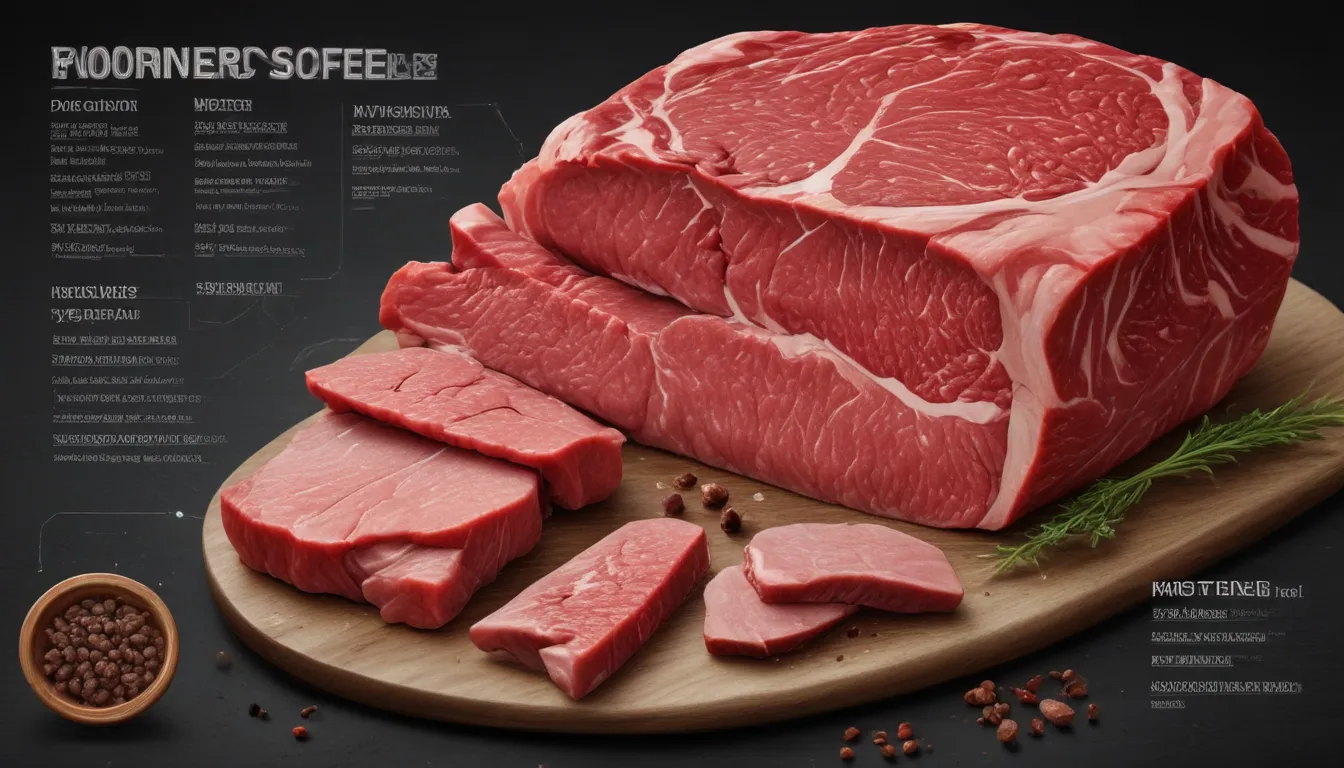The pictures in our articles might not always show exactly what the text is talking about. We use these images to make the article more interesting and eye-catching. They are there to add to the text, but not to replace it or show every detail.
Are you curious about the nutritional benefits of Wagyu beef? Or perhaps you simply can't resist its melt-in-your-mouth goodness? Either way, Wagyu beef has become a popular choice among meat lovers for its exceptional quality and unique flavor. Originating from Japan, Wagyu beef is known for its marbling, which provides a rich and tender texture unlike any other type of beef. In addition to its delicious taste, Wagyu beef also offers a range of nutrition benefits that make it a standout choice for health-conscious individuals. In this article, we will delve into 20 fascinating nutrition facts about Wagyu beef, shedding light on its nutrient profile, health benefits, and how it compares to other types of beef. So, let's explore what makes this delicacy a truly exceptional choice.
Key Takeaways:
- Wagyu beef is a protein-packed powerhouse, rich in essential vitamins, minerals, and healthy fats. It’s a delicious way to support muscle growth and overall health.
- With Wagyu beef, you’re not just indulging in a tasty meal – you’re fueling your body with nutrients like omega-3 fatty acids, CLA, and vitamin B12 for brain and heart health.
The Nutritional Value of Wagyu Beef:
Rich in Protein
Wagyu beef provides a high protein content, with approximately 26 grams per 100 grams serving. Protein is essential for muscle development, repair, and overall growth.
Essential Vitamins and Minerals
Wagyu beef contains essential vitamins such as vitamin B12, crucial for red blood cell production, and neurological function. Additionally, it is packed with minerals like zinc, iron, and selenium, which support a healthy immune system and aid in oxygen transport and energy production.
Healthy Fats and Omega-3 Fatty Acids
Wagyu beef is unique due to its high content of monounsaturated fats, particularly oleic acid. These fats have been associated with numerous health benefits, including improved heart health. Additionally, Wagyu beef contains omega-3 fatty acids, essential for brain health, reducing inflammation, and maintaining a healthy heart.
Conjugated Linoleic Acid (CLA)
Studies have shown that Wagyu beef contains higher levels of CLA, a type of fatty acid that may support weight management and reduce the risk of certain diseases.
Excellent Source of Leucine
Leucine is an essential amino acid known for its role in stimulating muscle protein synthesis. Wagyu beef is a rich source of leucine, making it an excellent choice for muscle recovery and growth.
How Wagyu Beef Compares:
Lower in Saturated Fat
Contrary to popular belief, Wagyu beef is lower in saturated fat compared to other beef varieties. This makes it a healthier choice for individuals concerned about their saturated fat intake.
Low in Carbohydrates and Gluten-Free
For those following a low-carb diet, Wagyu beef is a great option as it contains negligible amounts of carbohydrates. Additionally, Wagyu beef is naturally gluten-free, making it suitable for individuals with gluten allergies or sensitivities.
Nutrient-Dense and Source of Essential Amino Acids
With its impressive nutrient profile, including vitamins, minerals, proteins, and healthy fats, Wagyu beef can be considered a highly nutrient-dense food choice. It contains all essential amino acids that our bodies cannot produce on their own, playing essential roles in various bodily functions.
Additional Health Benefits:
High in Iron and Vitamin B6
Iron is crucial for red blood cell production and oxygen transport, with Wagyu beef providing a significant amount of iron per serving. Additionally, vitamin B6 found in Wagyu beef is important for brain development, hormone regulation, and immune function.
Natural Source of Creatine and Antioxidants
Wagyu beef naturally contains creatine, an amino acid derivative that aids in energy production, muscle strength, and endurance. It also contains antioxidants like vitamin E, which may help protect the body against oxidative stress and cellular damage.
The Impact on Overall Health:
Supports Bone Health and Muscle Repair
Wagyu beef is an excellent source of phosphorus and zinc, two minerals important for healthy bone structure and strength. Its unique composition makes it an ideal protein source for muscle repair and recovery, helping to maintain and build lean muscle mass.
Low Sodium Content
Compared to other beef varieties, Wagyu beef has a relatively low sodium content, which is beneficial for individuals watching their sodium intake.
Conclusion
In conclusion, Wagyu beef not only offers incredible flavor and tenderness but also numerous health benefits. With lower levels of saturated fats and higher concentrations of heart-healthy omega-3 fatty acids compared to conventional beef, Wagyu beef can be a nutritious choice for meat lovers. It is packed with essential vitamins and minerals that contribute to overall health and wellbeing. However, moderation is key, as Wagyu beef is still high in calories and should be consumed as part of a balanced diet. Opting for grass-fed Wagyu beef whenever possible can further enhance its beneficial nutrient levels. So, treat yourself to the nutritious and mouthwatering experience of Wagyu beef, knowing that you are nourishing your body with valuable nutrients.
FAQs
- Is Wagyu beef healthier than regular beef?
-
Yes, Wagyu beef tends to be healthier than regular beef. It has a higher concentration of heart-healthy omega-3 fatty acids and lower levels of saturated fats.
-
How does Wagyu beef get its tenderness?
-
Wagyu beef gets its tenderness from the higher amount of intramuscular marbling, which adds flavor and makes the meat incredibly tender.
-
What are the nutritional benefits of Wagyu beef?
-
Wagyu beef is packed with essential vitamins and minerals, including iron, zinc, and B vitamins. It also contains conjugated linoleic acid (CLA), linked to various health benefits.
-
How should I cook Wagyu beef?
-
Wagyu beef is best cooked on low to medium heat to ensure the marbling melts slowly and evenly, resulting in a melt-in-your-mouth texture.
-
Can I include Wagyu beef in a healthy diet?
- Absolutely! Wagyu beef can be included in a healthy diet when consumed in moderation. Pair it with nutrient-rich vegetables and opt for cooking methods that require less added fats.
Incorporating Wagyu beef into your diet can provide you with a range of essential nutrients that support your overall health and well-being. So, whether you're a meat lover looking for a nutritious choice or simply seeking to indulge in the delectable taste of Wagyu beef, you can savor each bite knowing you're nourishing your body with valuable nutrition.






